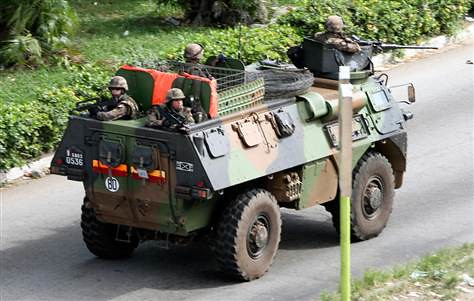
Tanks from the French occupation forces that are fighting to overthrow the government of Ivorian President Laurent Gbagbo. France and other imperialist states, including the UN, have demanded that the government be turned over to a rebel leader., a photo by Pan-African News Wire File Photos on Flickr.
Editor's Note: This article illustrates the biased character of the western corporate media since it does not question the legitimacy of the former colonial power France taking military action to oust an African government. Neither does this report question the results of the elections which they claim were won by the opposition figure Alassane Ouattara.
French forces join assault in Ivory Coast
French armored vehicles patrolled the streets in Abidja. The office of French President Nicolas Sarkozy said Monday that U.N. Secretary-General Ban Ki-moon had requested France's military participation in the war to force strongman leader Laurent Gbagbo from power.
ABIDJAN — A United Nations helicopter fired at President Laurent Gbagbo's forces on Monday as France authorized its military forces to take out his heavy weapons, an unprecedented escalation in the international community's efforts at forcing the strongman from office.
The office of French President Nicolas Sarkozy said U.N. Secretary-General Ban Ki-moon had requested France's military participation. Gbagbo lost presidential elections in November but refused to cede power even as his nation teetered on the brink of all-out civil war.
The helicopter fired on Gbagbo's troops at about 5 p.m. local time (1700 GMT) to prevent them from using heavy weapons at the Akouedo camp in Abidjan, said the spokesman for the U.N. Department of Peacekeeping Operations.
Spokesman Nick Birnback told reporters in New York that Gbagbo's forces have consistently used heavy weapons against civilians and peacekeepers in recent days. He says the action was taken according to the mandate the mission has from the U.N. Security Council.
The attacks on Gbagbo positions marked a dramatic escalation in the offensive to oust the strongman who has refused to cede power for more than four months since he was declared the loser of the presidential election.
Frederic Daguillon, the spokesman for the French force Licorne protecting civilians in Ivory Coast said earlier Monday on France-Info radio that the total French military presence in the former French colony is 1,650.
Meanwhile, fighters backing democratically elected leader Alassane Ouattara entered Abidjan by the truckload Monday afternoon as part of a final offensive to take the last piece of the West African country still largely controlled by Gbagbo.
A convoy of several dozen vehicles containing heavily armed pro-Ouattara troops and outfitted with mounted machine guns entered Ivory Coast's main city at midday, the first elements of a large force that had massed on the northern outskirts for what they called a "final assault," according to a Reuters eyewitness.
Heavy machine gun fire and a few explosions could be heard minutes after they entered the city limits.
The commanding officer of the forces, Issiaka "Wattao" Ouattara, told Reuters he had 4,000 men with him plus another 5,000 already in the city. Asked how long he would need to take Abidjan, Wattao said: "We know when it starts, but could take 48 hours to properly clean (the city)."
Gbagbo has refused to cede power after a disputed Nov. 28 election that U.N.-certified results showed Ouattara won, but Gbagbo rejected the results and accused the United Nations of bias. The standoff that followed has now turned into a resumption of the civil war of 2002-03.
After swiftly taking control of most of the country, pro-Ouattara forces have met fierce resistance in Abidjan where Gbagbo's troops are holding on to positions around the presidential palace, Gbagbo's residence, and state television.
After several days of fighting in Abidjan, nervous citizens ventured out to get food and water on Monday morning after being holed up at home because of the fighting.
Speaking on Sunday on the pro-Ouattara TCI television channel, Ouattara's prime minister, Guillaume Soro, said their strategy had been to encircle the city, harass Gbagbo's troops and gather intelligence on their arsenal.
"The situation is now ripe for a lightning offensive," which he said would come any time soon.
France said on Monday it was sending an extra 150 soldiers to help protect civilians in Ivory Coast.
The deployment brings the number of French troops in Ivory Coast to 1,650. France has about 12,000 nationals in the country and the French military contingent has already mounted patrols in Abidjan and taken control of the airport.
It had been expected that Ouattara's forces would quickly overrun Gbagbo's troops following defection by high ranking officers, but they have managed to withstand the assault so far and regain control of the state broadcaster RTI.
Through the television channel, they have broadcast virulent anti-French and anti-U.N. messages, while rallying support from Gbagbo's youth wing, the Young Patriots, who have formed a human chain around Gbagbo's residence and presidential palace.
A Reuters reporter saw scores of Young Patriots gather by the lagoon near the palace with plastic buckets and bottles to collect water, guarded by jumpy soldiers brandishing AK-47s.
Gbagbo's camp has also received a potential morale booster with the return of Army Gen. Philippe Mangou, who had sought refuge at the residence of the South African ambassador on Wednesday as pro-Ouattara troops advanced on Abidjan.
More than 1,500 people have been killed since the violence began five months ago.
The International Red Cross said it stuck by an estimate of 800 killed in the western town of Duekoue alone in intercommunal violence in one day last week, which Ouattara's camp has said was "exaggerated."
African Union Secretary General Jean Ping urged both sides to "show restraint and protect civilians" and said he hoped Ouattara would be able to take up "the office to which he has been democratically elected."
The Associated Press and Reuters contributed to this report.
No comments:
Post a Comment